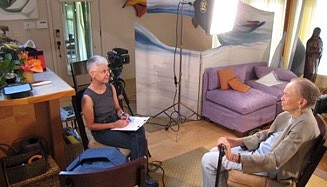
Lilian Burwell | New documentary highlights two local Black women artists who persevered against segregation and innovated DC’s art scene
February 6, 2021 - Kelly McDonell for The DC Line
When documentary filmmaker Cintia Cabib was showcasing two films at the Historical Society of Washington, D.C.’s 2014 conference on local history, she spotted an intriguing painting of the corner of Rhode Island Avenue and 3rd Street NW while perusing a small brochure. The modernist, geometric red hues of homes lining the LeDroit Park street and a gleaming, leafless tree bisecting the frame compelled Cabib to explore the work of the artist, Hilda Wilkinson Brown.
Years of research culminated in a new documentary produced and directed by Cabib called Kindred Spirits: Artists Hilda Wilkinson Brown and Lilian Thomas Burwell. The short film is being broadcast locally by PBS stations WHUT and MPT on Feb. 4 and by WETA’s World Channel on Feb. 10. PBS stations around the country have scheduled airings of the film for Black History Month programming.
The film rediscovers Brown, a mid-20th-century artist who painted DC’s neighborhoods and scenery; was a professor at Miner Teachers College in DC at a time when schools were segregated; and influenced her niece, Lilian Thomas Burwell, to become an artist as well.
In the film, Burwell, now 93 years old, recalls the life and artistry of her aunt and talks about growing up in DC — struggling against segregation and discrimination as she pursued her own abstract expressionist art career.
Cabib said her goal with this film was to bring both women’s art into public view. Brown has pieces in collections of the Smithsonian American Art Museum and the Metropolitan Museum of Art in New York. Her piece Third and Rhode Island, which initially caught Cabib’s eye, is part of a traveling exhibit by the Smithsonian. Burwell is opening a new exhibit of her abstract pieces in the Berry Campbell Gallery in New York City in April.
Cabib believes both women deserve more credit, especially during Black History Month.
“I hope [the film] makes people think about other Black artists,” Cabib said. “Who else has been unrecognized? Who else is out there?”
The influence that Brown and Burwell had in nurturing Black artists still resonates in DC’s artistic space. As an educator, Brown encouraged many Black women to pursue careers despite discriminatory and segregationist barriers. Burwell also taught art for years, building on the legacy of her aunt. Alongside its exploration of these women’s histories, Cabib’s film also details the stories of the historic Black institutions and neighborhoods that shaped their artwork.
The documentary shows that Brown’s work was celebrated in the Barnett Aden Gallery, the nation’s first Black, privately owned gallery. It opened in LeDroit Park as an integrated art space and after World War II became primarily an exhibitor for Black artists who were rejected from white-owned galleries. Cabib said she wanted to feature the history of the LeDroit Park neighborhood, which was bursting with Black creatives like Brown, scientists, civil rights activists and more.
Brown’s artwork was featured during her lifetime in The Crisis, the official NAACP publication founded by W.E.B. Du Bois, and The Brownies’ Book, the first magazine for Black children.
“It’s important to recognize the opportunities Black people made for themselves and each other after they’d been denied,” Cabib said.
The documentary was an official selection of the Martha’s Vineyard African American Film Festival and has been shown locally at events like the DC Black Film Festival and Alexandria Film Festival.
Cabib was able to host one in-person screening of Kindred Spirits at the Avalon Theatre in March 2020, just before DC declared a public health emergency due to the COVID-19 pandemic. The film was shown to high school students, and Cabib said she was encouraged by the attendees’ questions and engagements with the film and history. At subsequent virtual screenings, Cabib said Lilian was able to join discussions and share more of her story with audiences.
Cabib’s story came full circle in November when she showcased her film virtually at the 2020 DC History Conference, bringing Brown’s and Burwell’s stories into focus — not just in a brochure, but on screen.
Back to News
